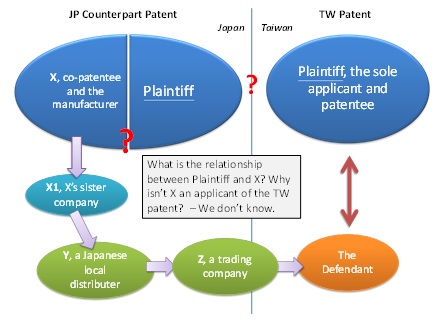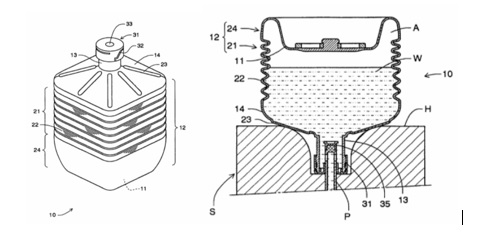In Taiwan's patent and trademark law regimes, the doctrine of international exhaustion is still the benchmark for addressing issues of parallel imports, also called "water goods" ("水貨," meaning "goods from the waters") in the Chinese-speaking world, suggesting that the goods however "genuine" are imported through a troubled and unchecked route.
In patent lawsuits, the exhaustion doctrine operates as an affirmative defense. To succeed in this defense, defendants need to prove that the parallel imports first sold abroad are "manufactured by the patentee or under its consent." Article 59.1.6 of the Patent Law. Obviously, the term "patentee" here refers to the owner of a Taiwan patent.
However, for various reasons, sometimes corresponding patents are owned by different entities, a situation known as "split patenting." If parallel imports are manufactured in a foreign country by a company that owns the foreign corresponding patent but does not own the Taiwan patent, the parallel imports may not appear to be "manufactured by the [Taiwan] patentee or under its consent" from a literal reading of the law.
The trademark law version of this issue was carefully reviewed by the IP Court last year in Ohwin Inc. v. Infinity Beauty Ltd., 106 Xing Zhi Shang Yi 11 (Taiwan's IP Court, May 2020) ( see our report here). Striking a balance between all interests concerned, the court held that exhaustion takes place even if the Taiwan registration and the foreign registration are owned by different entities, provided that these entities hold "a licensing or legal relationship" and the parallel imports are perceived by consumers as coming from the same source.
Following the footsteps of Ohwin, the "licensing or legal relationship" test now comes to "test the waters" in patent law. In a recent IP Court decision on a parallel import dispute arising from split patenting, it is held that consent from the Taiwan patent's owner can be deducted if she holds a "licensing or legal relationship" with the foreign patent's owner, marking the very first debut of the test in patent case. Premium Water, Inc. v. Aqua Vita, Co., Ltd., 108 Min Zhuan Su 99, Taiwan's IP Court (December 2020). The judge (Judge Yi-Shen LIN) who penned this decision said:
Under the principle of extraterritoriality, patents issued in different countries on a same invention indeed give rise to independent patent rights, whether the second application is filed by the same applicant or an authorized party. However, as the claimed invention is the same and the exclusive rights originate from the same entities, owners of corresponding patents issued in different countries are still subject to the doctrine of patent exhaustion if they hold a certain licensing or legal relationship.
Note the "consumer perception" prong of the test in trademark cases is absent here as patent right does not reply upon use and consumer perception.
Yet the decision does not render an in-depth analysis on how to prove the existence and nature of a licensing or legal relationship. That is because Premium Water springs from a particular type of split patenting. In Premium Water, while the parallel imports sold abroad (in Japan) were manufactured by a third party who owns the corresponding Japan patent, this third party actually co-owns the Japan patent with the Taiwan patent's owner, as illustrated in the chart below.

In the Judge's perspective, the formation of a patent co-ownership as such suggests an underlying "licensing or legal relationship" that warrants an (implicit) consent or licensing:
Given the fact that the plaintiff and X jointly own the Japanese invention patent, there must be an economic or legal relationship underlying their co-ownership. Considering the absence of any special agreement between them, it should be concluded that the plaintiff and X must have permitted or licensed each other to implement the invention patent.
It is noteworthy that, in Japan, as in Taiwan and many other jurisdictions, a co-owner may "work the patented invention without the consent of the other [co-owner(s)]," "unless otherwise agreed upon by a contract." Article 73.2 of Japan's Patent Act (2006). This fact was used by the plaintiff to support its claim that it never consented to the manufacture and sales of the disputed parallel imports. To put it simply, just because a co-owner obeys the law to tolerate another co-owner's activities does not mean she has given her consent. Further, the plaintiff stressed that they never received any reward from the first-sales which many believe is the cornerstone of the exhaustion doctrine (yet first-sale reward is not present in the text of Taiwan's Patent Law). Nevertheless, these arguments were found immaterial by the judge. It is not clear whether the plaintiff has appealed.
The patent in dispute is TW I412471 entitled "A Water Server Bottle" and claiming priority from Japan patent applications JP 20080269087 and JP 20080187700. As to the products in dispute, they are PET bottles containing water advertised to be sourced from Japan's Mount Fuji. When the water is let to flow out, the bottle having a bellows-shaped upper part is compressed down into an desired space-saving shape by atmospheric pressure.

Figs. 1 & 5A of the '471 Patent
The content of this article is intended to provide a general guide to the subject matter. Specialist advice should be sought about your specific circumstances.

